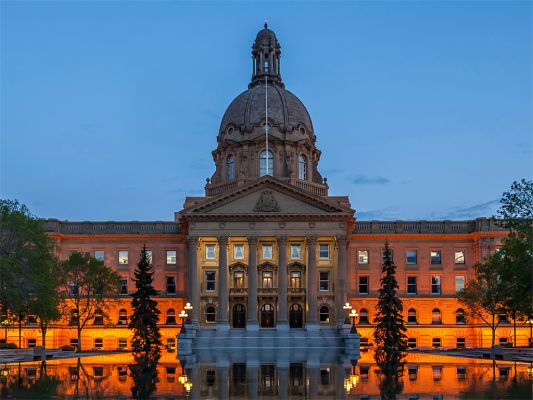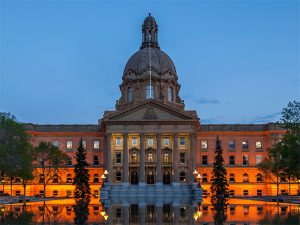 For this edition of the Member Interview Series, we are fortunate to be joined by Certified Court Interpreter Carmen Aguilera, an active member and current Vice President (Southern Alberta) of the Association of Translators and Interpreters of Alberta (ATIA).
For this edition of the Member Interview Series, we are fortunate to be joined by Certified Court Interpreter Carmen Aguilera, an active member and current Vice President (Southern Alberta) of the Association of Translators and Interpreters of Alberta (ATIA).
Carmen’s incredible career has taken her from practicing law in Guatemala, to coordinating justice system improvement projects for the United States Agency for International Development, to an appointment as Minister Counselor for the Embassy in Guatemala in both Ottawa and Washington; and finally to becoming a Certified Court Interpreter and Certified Community Interpreter with the ATIA in 2015. Also a full member of the Alberta Court Interpreters Association since 2006, Carmen was given the Honorary Member designation in 2019.
Thank you for joining us Carmen!
Could you elaborate on how you went from practicing law, to international relations, to court interpretation, and finally becoming a Certified Court Interpreter?
Speaking Spanish and English in Guatemala was a plus to get the best jobs, especially with international organizations that were the best and highest paying employers. Guatemala is so close and economically influenced by the US that English was the language they were looking for in your resume. I started working when I was 18 years old, in a travel agency, went back to the USA for two years of Junior College, returned to Guatemala and from there, a receptionist, a bilingual secretary, administrative assistant. All of these jobs required English and Spanish. You would have to type, take dictation, be in meetings and be able to communicate fluently in both languages. Sometimes even interpret in an informal basis for both languages.
I started Law School in Guatemala and continued to work as long as I could as an Administrative Assistant in a development branch of the US State Department called the United States Agency for International Development (USAID Mission to Guatemala) until my Law studies required me to go and work as a court clerk in the Justice System there.
Finishing Law School, I was again hired by USAID/Guatemala to work as a Project Coordinator in a program created to improve the administration of justice, this included among many activities, the training of Judges. One of the programs was to create Rural Courts where the personnel including the Judge, spoke the Indigenous language of the community. Interpretation existed but the combination of languages was Spanish and local dialects. Although I do not speak any of these Mayan dialects, I was very fond of these programs. This is another example of my informal relation with interpretation.
For my work in the area of communities and human rights, the then named Ambassador of Guatemala to Canada asked me to him at the Guatemalan Embassy in Ottawa as Minister Counsellor for three years; from there I was transferred to the Embassy of Guatemala in Washington, D.C. as Minister/Legal Counsellor. At that time I met my husband, a Canadian citizen living in Alberta whom I met during a visit to the 1997 Stampede.
Arriving in Calgary in April 2000, I tried to find my space in the workplace in a small city compared to Ottawa, Washington, D.C. and Guatemala, where I was supposed to continue with my career as a Lawyer. Through small non-profit entities that assist newly arrived immigrants, I again took English classes at Bow Valley College to enter graduate studies. In the middle of that, an opportunity came to study a program called “Interpreting for the Justice Sector,” offering a real situation for getting a job and doing it better with the appropriate training.
I had already been in contact with ATIA trying to get into translation; however, the interpretation sector and the course allowed me to become an Associate Interpreter with ATIA. Being a Lawyer, it was related to my background and it became little by little a professional activity with its challenges in a new legal system. Years of interpretation in different settings, mainly court, allowed me to become a Certified Court Interpreter.
Beyond your educational background in English, law, and interpretation, you have also undertaken studies at the graduate level in environmental law and international trade; computing; oil and gas industry; and education and research, among others. What can you tell us about your relationship with ongoing learning and professional development?
Professional Development is key in any activity, is in mandatory in many professions, Lawyers, Doctors, Nurses, IT people. The world is changing and the advances in technology, mass immigration around the world, trade, cultures living together, I do not see how you can miss it.
I have attended many seminars, workshops, events, they all have helped me in interpretation to understand and do a better job. I am my worst critic. I also help by organizing Mini-Courses for Court Interpreters at the Calgary Courts Centre, with instructors who are Judges, Defence Lawyers, and Crown Prosecutors. They help interpreters with vocabulary, what different types of Procedures mean, and how to be better prepared for what will happen in court. With all this training you understand the elements, the techniques of formal interpretation.
As an active member of a number of professional and regulatory associations, including the Guatemalan Bar Association, the Association of Translators and Interpreters of Alberta, and the Alberta Court Interpreters Association, could you tell us about why you chose membership in these associations, and how this has impacted your career?
These associations are related to my work as an interpreter and support me as a member, they also allow me to get work and be recognized. It is important to show your employers that you belong to associations that are registered and support you with professional development.
After the Bow Valley Course in interpreting for the justice sector, I started having a better understanding of the professional and technical form of interpretation. I joined the associations to meet interpreters, work with them and participate in social or professional activities with members.
I have learned many things about interpretation from my colleagues; you cannot be isolated in your profession.
What kind of developments have you observed in the ATIA and its role in the language sector over the 14 years of your membership? How do you envision its direction in the future?
ATIA is this year celebrating 41styear since it was founded. I related to ATIA since I arrived in Calgary, initially for the translation area. It has done a very good job of not only keeping the organization alive for such a long time and developing a more professional system for translators and now working with different designations in interpretation, such as community/cultural, medical, court interpretation. Conference interpretation and Editing is still to be developed.
ATIA in the future will need to focus more on interpretation, and part of the challenge is that there are no specialized schools for this activity in Calgary, nor in Edmonton, the capital of the province. For this reason, it is recommended that the new members and for those current members that want to become Certified in any of the interpretation designations and did not have the chance to take valuable interpretation courses that were given in the past, should take the CISOC course (Cultural Interpretation Services for our Communities) on-line as an excellent introduction and training for interpreters.
The path that an association such as ATIA will continue to evolve and change to adapt to the economic and political events of our province in the future, also increased immigration and new languages can have an impact in ATIA’s development, and more than anything else the number of new members that will become certified and will have a say in the decisions and directions that ATIA will take.
Interested in sharing your story in the Member Interview Series? Contact development@atia.ab.ca for more information!




 For this edition of the Member Interview Series, we are fortunate to be joined by Certified Court Interpreter Carmen Aguilera, an active member and current Vice President (Southern Alberta) of the Association of Translators and Interpreters of Alberta (ATIA).
For this edition of the Member Interview Series, we are fortunate to be joined by Certified Court Interpreter Carmen Aguilera, an active member and current Vice President (Southern Alberta) of the Association of Translators and Interpreters of Alberta (ATIA).

